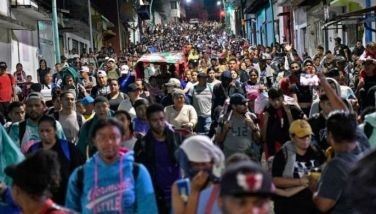Combative Venezuela opposition leader will head congress
CARACAS — An outspoken opposition leader known for embracing confrontation was chosen Sunday to head Venezuela's new congress when it opens in two days as a counterweight to the socialist administration.
The newly elected opposition majority voted to make Henry Ramos Allup the president of the National Assembly when it is seated Tuesday. The new session will be the first time foes of the administration have had control of any government institution in more than a decade.
Ramos, 72, is a divisive figure that government supporters love to hate as much for his acerbic tongue as for his leadership in the once-hegemonic Democratic Action party that co-governed Venezuela for decades before the late President Hugo Chavez won power in 1998 and began his leftist program.
Ramos' rival for the legislative presidency was Julio Borges, 46, a member of the Justice First party, a newer, moderate movement that won the biggest bloc of opposition seats.
Although Ramos hasn't joined in street protests against the government, he won with the help of opposition hard-liners who favor such demonstrations and other confrontation with President Nicolas Maduro's administration. Borges' party advocates a focus on negotiation and elections.
Ramos said the new National Assembly will show Venezuelans a more democratic way forward.
"We ask the people to watch us, to demand more of us, and keep an eye on what we do to make sure that we honor our commitment," he said.
Ramos' supporters praise him as an experienced operative well-positioned to wrangle the dozens of parties that make up Venezuela's opposition coalition and stand up to what is sure to be an offensive by the administration.
Skeptics say Ramos is too prone to spouting off and plays into the government's attempts to paint the opposition as entitled snobs nostalgic for the days when elites ran Venezuela.
The opposition won a crucial two-thirds legislative "super-majority" by a single seat in the Dec. 6 elections and it will need to corral every lawmaker to get through the most dramatic policies.
But policy and strategy disagreements within the opposition will make it hard to get the most high-stakes votes through, said R. Evan Ellis, a professor of Latin American studies at the United States Army War College Strategic Studies Institute.
"I suspect that the government will also use a combination of personal inducements and legal intimidation to try to coopt some of the members of the new congress," he said.
The opposition has long been split between moderates and hard-liners, and the two sides have exchanged barbs since their coalition's landslide victory over the socialists.
Even as the scale of the victory was still settling after polls closed, some opposition members began talking jubilantly about taking steps to remove Maduro and rewrite the constitution while others cautioned that the voters wanted economic reforms rather than a political fight.
Justice First leader Henrique Capriles, a governor who narrowly lost to Maduro in the last presidential election in 2013, called the opposition's legislative victory a vindication of his party's focus on building electoral support district by district. His party won 33 of the opposition's 112 seats in the new congress.
In recent weeks, Capriles has lambasted opposition leaders who have advocated street activism, particularly a wave of protests that shut down parts of Venezuela in 2014 and resulted in dozens of deaths.
Carpriles said that if the opposition had continued to pursue open confrontation in the streets, the coalition would never have won congress. The street protest movement "must be named among our greatest national failures," he told the Venezuelan weekly Tal Cual.
Supporters of Capriles' chief rival, the imprisoned hardline opposition politician Leopoldo Lopez, angrily rejected that criticism. Lopez's father, Leopoldo Lopez Gil, tweeted that he was glad Capriles is a governor and doesn't have a seat in the "new, brave congress." He also backed Ramos' leadership bid.
Lopez has been sentenced to more than a decade in prison in connection with his leadership of the 2014 protests, and he consistently polls as one of the nation's most popular leaders along with Capriles.
The government has so far showed few signs of willingness to negotiate. The outgoing congress filled the Supreme Court with newly appointed judges, and the court last week barred three opposition lawmakers from being sworn in.
Ramos on Sunday reiterated the opposition's pledge that all 112 lawmakers would take their seats despite the ruling, setting the stage for a showdown. Both the opposition and supporters of the administration are promising to convene at the National Assembly building Tuesday.
- Latest
- Trending





























